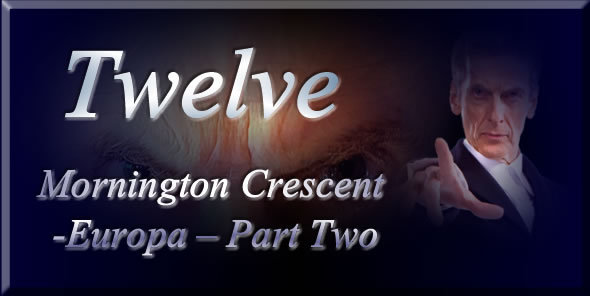
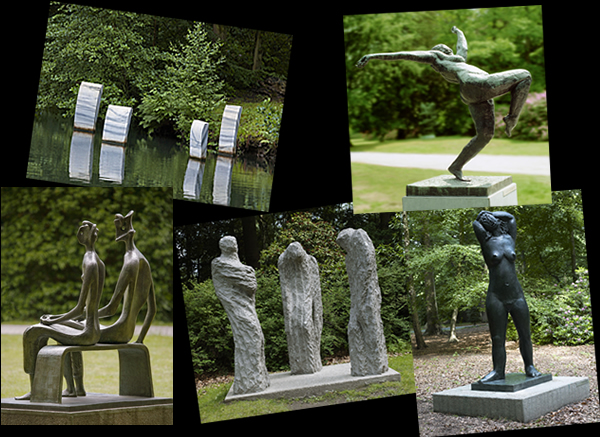
Marie breathed in warm, flower scented air and guessed it was mid-morning somewhere in Europe. They had left the TARDIS parked next to a pair of ornamental iron gates and passed into the sort of park that surrounded old Stately Homes. A substantial house of late eighteenth century style could be seen, but The Doctor was steering away from it.
“All right, tell me where we are,” she insisted.
“A lovely place called Middelheim,” he answered. “The house isn’t really important to us. The park around it is. This is the biggest open air sculpture park in Europe and has works from the greatest artists of your twentieth century and onwards. Well, its 2016, so mostly twentieth century.”
He opened his hand on the tiny lead figure. It looked like two vaguely humanoid figures sitting side by side.
“Henry Moore… one of the leading lights of that century in the medium of sculpture.”
“Henry Moore, wow. This place has the big names.”
As they emerged from a tree-lined footpath onto a wide open area bathed in sunshine, Marie saw dozens of larger than life works of art in apparently haphazard arrangement. It was at least an hour before noon, but the park was already busy with visitors admiring the works, taking quirky selfies with the odder pieces, and even picnicking on the grass with priceless works of art around them.
Marie stepped towards a plinth upon which a larger than life figure of a woman was frozen in the middle of something like a leap of delight, one leg raised, arms and head thrown back. A plaque near the ground identified it as a work by a man called Rika Wouters, who modelled the statue on his wife, Nel.
It was called ‘The Mad Maiden’.
Marie laughed.
“If this was in Phoenix Park she would have been rechristened as ‘the right 'oul hussy' or 'the brazen hoor' or 'the nudie floozie'. Mad Maiden wouldn’t come close to it for Dubliners.”
“Very perceptive people,” The Doctor agreed. From his pocket he produced a map indicating the most famous of the works. “I downloaded the PDF file,” he answered to Marie’s quizzical expression. “If ‘Nudie Floozie’ is here then Moore’s King and Queen are over there.”
He headed diagonally across the lawn, skirting around the picnickers, to a slight rise upon which the figures sat regally.
“Moore refers to the notion of royalty, which he considered ancient and primitive,” Marie read. “This royal couple does not in any way refer to present-day royalty but rather to the very archaic idea of a dynasty.”
She looked at the gaunt, angular figures with distinctly inhuman heads critically.
“If I said they look a bit alien, would it be racist or species-ist or something?”
"Yes," The Doctor replied. "Except I agree. They look like a cross between the Voord of Marinus and the Melkur. You really don’t want to meet either. But these characters are benign enough. I remember having a cuppa with Henry while he was working on them. He said the idea came from reading fairy stories about kings and queens to his daughter.”
As he talked on about afternoons in the workshops of artistic geniuses, he did what nobody was supposed to do – he climbed up onto the bronze figures, searching them thoroughly.
“Here we are,” he said, returning to the ground waving a credit card sized piece of laminated plastic with a magnetic side.
“A fridge magnet,” Marie laughed.
“A fridge magnet with our next clue written in futhark, the ancient script of northern Europe. Luckily I read ancient scripts.”
“So that’s all we have to do? Just go see this one statue?” Marie felt curiously let down. “Can’t we stay here in the sunshine a bit longer? This place is amazing. Let’s look at some more of the art.”
“Why not?” The Doctor agreed. He gave her the printout. The not exactly to scale map had numbers indicating the location of the most famous artworks and a key at the bottom. The only trouble was, as Marie was forced to admit, she had only heard of three of the sculptors, including Henry Moore. That meant that she had no idea what to expect.
Though that made it more exciting in a way. Each new installation was a surprise.
It was enjoyable even if some of the works were a little bewildering. Of those not requiring lateral thinking to interpret, three more figures of naked women, including Constant Permeke’s Marie-Lou, a larger than life bronze with heavy thighs and little left to the imagination, were re-christened as ‘Floozies’. At another stop on the art trail, The Doctor admitted to having met a race of people who resembled Eugène Dodeigne’s Three Standing Figures. Since the three were large stones with just the vague suggestion of humanoid form, ‘hewn but unhewn’ as the plaque explained, Marie thought they must have been a very odd race.
“They are,” The Doctor agreed. “Really hard to get a cup of tea on a planet of silicone lifeforms with no actual mouths.”
But Franz West’s Sphairos defied description by either of them. The plaque identified the huge, misshapen sphere as “An incomplete geometric form made from aluminium sprayed with car paint.”
“Art is what you make of it,” The Doctor pointed out. “What does it make you think about?”
“It makes me think about a gob of half chewed toffee I once stepped on in the school corridor,” Marie replied. “Doesn’t do much else for me. Don’t call me a philistine or anything. I go up to the Hugh Lane Gallery every time they have a new temporary exhibition. They’ve had weirder stuff than this. I just think when we got the kids at school collecting Coke cans for recycling we expected a more practical use for our efforts.”
The Doctor laughed and consulted the map again. They walked on, away from the open lawn and towards what could only be described as a forest glade. In amongst the trees was a pond of clear, rubbish free, unpolluted water. That in itself was lovely to look at, but it was also the site of Luciana Fabio’s Bathers. He was another sculptor who wasn’t bothered about figures looking realistic. The four ‘bathers’ were blocks of angular marble. Not only did the white stone create interesting reflections in the clear water, but their polished surfaces reflected the sunlight through the trees and the light on the water. The result was a work of sculpture in stone that was never stationary, that even gave the illusion of movement, something quite unexpected in marble.
“I like it,” Marie said. “I really do. And I absolutely GET this once, unlike ‘gob of toffee’.
She sat down on the grassy bank to enjoy the work more thoroughly. The Doctor moved closer, actually taking off his shoes and socks and rolling up his trousers to investigate closer.
“What are you doing?” Marie asked.
“I think there’s another fridge magnet on one of the bathers,” The Doctor called back. “I’m just having a look.”
“That’s marble. Fridge magnets don’t work on marble,” Marie pointed out. The Doctor looked ready to make a complicated reply about alien magnets working on marble when he disappeared from view in a splash of pond water.
“Trust you to fall in,” Marie called out, but she was on her feet, running to help him all the same. As he broke the surface she grabbed his hands, but to her horror something was pulling him back under. She saw a shadowy form beneath the water reaching out to drag The Doctor into the deeper part of the pond.
“Help!” she cried out, hardly expecting anyone to hear.
She didn’t expect a teenage boy to run past her and jump feet first into the water. He tussled with the shadowy figure and Marie felt The Doctor suddenly freed from its grasp. He surfaced, gasping, then grabbed the boy and pulled him up as well. The shadow dissolved beneath the agitated water. As the two emerged onto the dry bank, a girl came running and shrieking to hug the boy.
“Don’t, you’ll get all wet,” the boy protested, to no avail. He turned to look at The Doctor. “Are you all right, sir?”
“Quite all right, Luke,” he answered. The boy was puzzled at first, then he smiled widely and introduced his sister to their mother’s oldest friend, The Doctor.
“We’re on the Quest,” he explained. “Our clue brought us to The Bathers.”
“Then this must be yours,” The Doctor said, handing him the ‘fridge magnet’ that did marble. “Yours is in Ogham. You might be going to Ireland, next.”
“A change of clothes at the TARDIS, then a light lunch at the park café, first,” Marie suggested. “And I might be able to help. I did the Ogham alphabet with my class last year.”
Lunch at the open air café in dry clothes was pleasant. Luke and Sky were good company. They talked about their progress so far in the Quest while Marie translated the Ogham text. The Doctor told the youngsters about one of his adventures with Sarah-Jane Smith when she was a young woman who travelled with him.
The one thing they didn’t allude to at all was the latest attempt by the shadowy assassin to do harm to The Doctor. Nobody wanted to spoil the pleasant interlude by talking about it.
Besides, something else troubled Marie. While Sky and Luke went to choose ice creams for dessert she put her concern to The Doctor.
“This clue leads to Montpellier Hill, near Tallaght, also known as the Irish Hell Fire Club. In the Eighteenth Century bored young Irish aristocrats went up there for drink and debauchery, to play at devil worship and occult stuff. In the War of Independence and the Civil War, the IRA stashed weapons and practiced sniping up there. In the sixties and seventies it was hippies and experimental drugs. Pretty much since then the experiments were done with and the junkies knew exactly what to do with the drugs. The old burnt out house is usually littered with broken syringes, beer cans, cider bottles and other filth. Rough sleepers hang out there, gangs have knife fights. People have been killed.”
The Doctor waited patiently for her to get to the point.
“The point is, that even with time travel, I can’t think of a time when that place was suitable for a couple of kids to be up there on their own. Granted, Luke is a smart boy, well beyond his age, but even so….”
“Less went on in any of the Hellfire Clubs, Irish, British or other, than people who weren’t there imagine,” The Doctor told her. “The Irish one, by the time they’d all trudged up the hill, the worst most of them got up to was drinking too much of a whisky-like drink called Scaltheen. After three glasses they probably dreamt most of the debauchery and devilry.”
Marie looked hard at him.
“You may be right, all the same. Sarah-Jane would have my hide if I didn’t exercise a duty of care. What do you want to do?”
“I don’t know. I was thinking about swapping cards. What’s our quest?”
“Dinner in a Copenhagen restaurant that specialises in steak tartare flavoured with sea salt and wood ants.”
Marie gave The Doctor an odd look.
“It’s not that bad,” he assured her. “The ants produce formic acid. It gives a nice sharp taste to the meat, like squeezing lemon over it.”
“Did you notice that young Sky ordered salad for lunch. She may be vegetarian. I’m not sure that’s a suitable quest for them, either.”
The youngsters returned with ice cream desserts for all. The Doctor accepted his graciously before suggesting a lift in the TARDIS to Montpellier Hill.
“Marie assures me it is a tiresome slog uphill,” he said. “And vortex manipulators are notoriously difficult to pilot accurately.”
“Oh, but we’ve had no trouble so far,” Sky assured him. “In fact, we….”
“It’s a great idea,” Luke said, quickly. “Thank you, Doctor.”
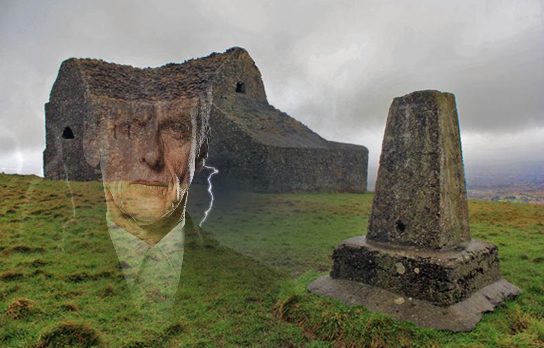
“August, Nineteen-Forty,” The Doctor said, looking from the top of Montpellier Hill all the way across the city of Dublin to the Irish Sea. Luke was beside him, enjoying the view under a warm blue sky. “Marie was right. This has been a troubled country for a long time, but right now it’s the rest of Europe that’s troubled. Ireland is a bit less troubled than everywhere else.”
“That’s why you brought us here,” Luke said. “In this time, rather than any other. I did look up Montpellier when everyone was talking. It didn’t seem like a place to bring Sky. Even now, that old house doesn’t look very nice.”
Marie and Sky were sitting in the sunshine watching a herd of deer ambling across the brow of the hill. The Doctor and Luke turned to walk up to the old hunting lodge built by the Speaker of the Irish House of Commons, William Conolly, in the 1720s and reduced to a shell by fire in the 1780s. After nearly two hundred years as a ruin there was a glowering darkness about the place. Even The Doctor felt a repugnance for it despite knowing first hand that its reputation for ghosts and devilment was entirely fictitious.
They entered the ruin despite misgivings and sought out the fireplace in the main room that the Ogham clue had indicated. Luke ran his hand carefully inside the flue.
“Here it is,” he said, withdrawing a sooty hand clutching a small leather pouch. He started to open it, but The Doctor gave him a warning glance. There was a soft noise upstairs, as if somebody was moving slowly, trying not to be heard. The sound moved towards the stone stairs that had survived the years of neglect, then a figure appeared, a thin, dishevelled man, badly in need of a shave, brandishing a handgun that The Doctor immediately recognised as of German make.
“Stay… away… stay away from me,” he said in broken English. “I will… kill you.”
“I’m not so sure about that,” The Doctor answered, holding his position on the bottom step without a flicker of fear on his face. Indeed, it was the man with the gun who looked scared out of all reason.
“It’s all right,” Luke said in flawless German, moving slowly and calmly closer to The Doctor. “We’re not here to hurt you, I promise.”
The gun was wavering in the man’s shaking hand. The Doctor moved one more step up and stared at him with the full force of his attack eyebrows.
“Why don’t you give me that,” he said, reaching for the gun. The man almost did as he said, but his nervousness was so acute he dropped it instead. Luke dashed to pick it up and make it safe. “Come on, a bit of food and fresh air will do you good,” The Doctor added. “Luke, run to the TARDIS kitchen and see what’s in the fridge.”
Luke did as he asked. The Doctor led the trembling man outside into the clean hilltop air. Marie and Sky were both surprised to see him, but did their best to help, giving him a drink from a plastic bottle of fizzy orange that was fifty years away from the supermarket shelves – after the supermarket had been invented, for that matter. He drank without tasting or questioning the liquid and ate some of the cold food Luke brought on a big plate.
“You’re a German spy?” It was Luke who asked the question. “Sent to infiltrate Britain through neutral Ireland.”
Marie nodded in understanding. The story of how the Third Reich tried to take advantage of partitioned Ireland was well known.
And yet that didn’t quite seem right….
“I am Herz Brenner,” the man said. “I am from Cologne. I came to this country by boat and was brought to this hiding place by my contacts in your IRA. I was meant to stay one night before they would come back with identity papers and a car that would take me elsewhere. But they did not come back. It has been a week. I have no food, no money. I do not know the city below me. I could not seek help....”
“There’s a local story about three men from the ‘Brigade’ who died in a car crash one night in nineteen-forty,” Marie confirmed. “Ireland isn’t at war, but there is a blackout, and roads are dark.” She felt that her tenses were very mixed between her local history and their current temporal location, but her friends understood her meaning.
“Explains why nobody came back to him,” Luke commented.
“Yes, but that’s only half the story, isn’t it,” Marie added. She glanced at the plate Luke had brought. Though the man was desperately hungry he had left a large slice of fresh, juicy ham and egg pie. “You’re not a German spy at all. You’re….”
“Ah!” The Doctor remarked dryly.
“I am Salomon Kramer,” the hungry German revised. “Brenner is a friend of mine. He has risked much to put me on the boat in his place. I hope he is still alive back home in Germany. His actions will not be understood.” He glanced at the surprised listeners. “Yes, I am a Jew. I was afraid to tell you….”
“What?” Sky was appalled. “You mean you thought we’d be kinder to a spy than a Jew?” She looked at the adults around her who shook their heads in understanding. “But I thought the war was about saving Jewish people from those horrible camps.”
“The war is about property and territory like every other war,” The Doctor told her. “Few people in the allied countries knew about the camps and many thought Hitler had the right idea in getting rid of Jews.”
“That’s horrible.”
“Yes, it is,” Marie agreed. “Sky, why don’t you take the pork pie back to the fridge and put as much bread and cheese and other things Mr Kramer CAN eat into a bag. Something to drink, too, but not Club Orange in PET bottles.” She reached into her pocket for a pen and paper and wrote down an address and a neat little map of intersecting roads. “Salomon, this is the location of the Hebrew Congregation in Terenure. It’s a bit of a tiring walk for you, but not so far as you’ve come already.”
Yes, of course, the TARDIS could drop him off in moments, but that would introduce him to technology he was not meant to know about. Besides, if he made the journey by his own effort he wouldn’t have to lie to anyone about his journey. He wouldn’t have to lie about anything again.
Salomon Kramer cried at the kindness shown to him. He took the food and drink and directions to a place of safety gratefully. The Doctor walked part of the way down the hill with him. By the time he returned Luke and Sky had worked out the clue that was in the fireplace at the Hellfire Club.
“It’s a place in the Netherlands that has a street festival with dahlia flowers,” Sky explained. “It sounds nicer than this. I mean… sorry, Marie. I’m sure Ireland is nice everywhere else, but I think that house is creepy, and that poor man would have died if we hadn’t found him. I’ll be glad to go somewhere else.”
“I understand,” Marie told her. “Maybe you can have a nicer trip to Ireland another time. There are better places than this to see.”
The two youngsters left by vortex manipulator. Marie collected all traces of a non-contemporaneous picnic and headed to the TARDIS.
“Steak tartare au ants it is, then?”
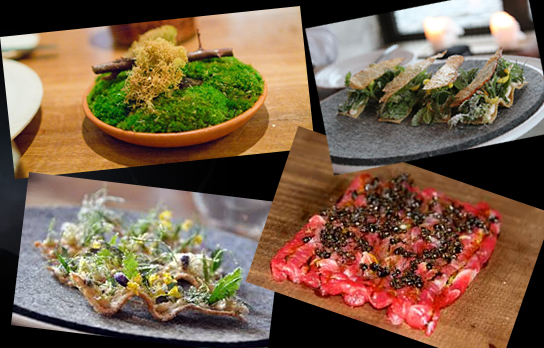
Since it was still not very long since lunch in Belgium, they saw a few of the more usual sights of Copenhagen for the afternoon, including the Little Mermaid and the Hans Christian Anderson museum. As a warm evening drew in and Marie was starting to feel a little hungry, though not necessarily for raw meat and ants, they came to a regenerated and gentrified part of the old Copenhagen docklands where one of the top five restaurants in the world was to be found. It was called Noma, which was a contraction of Nordisk Mad. ‘Mad’ was not a comment on the peculiar menu, but Danish for ‘food’. Marie reminded herself of that when one of the starter dishes brought to the table was soup served inside a hollowed out beet drunk through a ‘straw’ made of celery. The cep mushrooms on edible moss also stretched credibility. Burnt leek stuffed with cod roe was almost a ‘normal’ haute cuisine dish except that it was served on a piece of pine bark instead of a plate.
The steak tartare with ants really was too much, though. She couldn’t eat it, and she was a little appalled at The Doctor for managing both portions.
“The universe contains stranger things to eat,” he told her. “There’s….”
“I don’t want to know,” Marie insisted, shutting down her imagination before The Doctor could fill it with soup made with live fish jumping about in it or eyeball stew. “Besides…..”
She grasped the rough-hewn slate that The Doctor’s steak tartare had been served on. She had just seen something etched beneath the greasy streaks left over from his meat. She wiped it down with a napkin and held it up to the light.
“I’ve found our next clue,” she said.
“Excellent,” The Doctor replied. “But we’ve still got several courses of Nordic culinary delights, yet. You don’t want to miss chocolate covered deep fried pork belly as dessert.”
“I’m from Dublin not Glasgow,” she pointed out. “We don’t put chocolate on fried food.”
The Doctor grinned and polished off the second helping of steak tartare, forking the last ant onto the last mouthful.
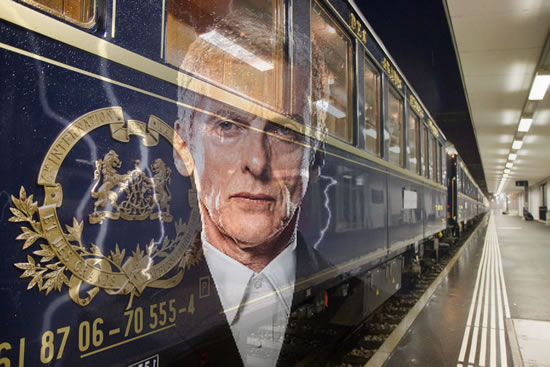
As The Doctor programmed their next destination Marie admired the exquisite etching on the slate she had secreted out of Nomad. Even in small scale the carriages pulled by a steam locomotive were obviously the Orient Express. Beneath it was a reservation number and a date and time for boarding the train.
“There is no ‘THE Orient Express,” The Doctor pointed out. “There has never been a definitive train like The Flying Scotsman or The Mallard, or Trainy Mac Trainface. The Orient Express is the name given to any of several train schedules going from Paris to Istanbul or sometimes just as far as Vienna from 187… to 2009 when the regular service ended.”
“Spoil the romance, why don’t you,” Marie answered, though she knew that really. “We’re on one of the ‘classic’ journeys though? October Nineteen-thirty-three?”
“We are. So go and put on a nineteen-thirties dress while I land us in the luggage car.”
Marie chose a chic little black dress with a gold flower motif on one shoulder and a cloche hat. The Doctor was in his ubiquitous velvet jacket that could belong just about anywhere. He held her arm as they sauntered along the swaying corridor to the first class restaurant car. It was after midnight somewhere east of Budapest a d the restaurant was doubling as a quiet late bar for insomniacs. As the two new passengers slipped into their seats and The Doctor gave the waiter orders for a single malt and a small white wine, two men in dark overcoats and fedora hats continued a sotto voce conversation in the corner. A woman in a silk evening dress looked as if she had been crying and drinking gin most of the night. A slim man in a slightly crumpled but well-made suit had a drink in front of him but was not drinking it. He glanced nervously out of the window at a rather dark, blustery night with rain battering against the glass.
“They look like characters from a spy novel,” Marie said quietly. “They’ve all got a story to tell. Those two have to be spies. The woman is an American movie star who just broke up with ….. Junior. The man sitting alone is a jewel thief…..”
“Wrong,” The Doctor told her. “The two men are lovers, both with wives at home as cover for their true leanings. The woman is an eastern European heiress who poisoned her husband because he beat her regularly. She’s travelling from Romania to Austria to be with friends who will protect her. We’re currently speeding away from Budapest in Hungary towards the border. She is almost safe. The young man is the spy, not a very good one, in point of fact. The nerves are really telling.”
“Poisoned her husband?”
“He deserves it. He cheats on her as well as the domestic violence.”
“Yes, but…. Oh, never mind. Where do you think the clue is?”
“Somewhere we least expect it,” The Doctor replied. “Like....”
He set his whiskey glass down on the napkin the waiter had out down on the table with the drink. He peered through the glass at the fabric.
“Ah.”
Marie looked at him expectantly, but his discovery through the magnifying effect of a whiskey glass was forgotten when the window across the aisle from their table suddenly shattered. The roar of the speeding train was swallowed by the screams of shocked passengers and the outraged cry of the dark figure that launched itself through the window at The Doctor. Marie was one of those screaming, but she was also fighting, trying to pull the long, talon-like fingers from The Doctor’s neck as they rolled on the floor.
“Get off him!” cried an eastern European woman’s voice. Marie saw a silver butter knife pressed against the back of the dark alien’s neck. She briefly wondered if there was something significant about the three male passengers and the bar tender staring open-mouthed while the only woman joined the fight. But the important thing was that the extra pair of hands swung the fight their way. Between them Marie and the husband poisoning heiress freed The Doctor from the creature’s deadly grasp. A device flew from the scrawny arm as they restrained him. Marie grasped it as they all stood and looked at their captive.
“A vortex manipulator like the one Luke had,” she said. “That’s how he’s been tracking us. But how did he know how to be ahead of us in Rome and Barcelona? Is Lord Sweetwell in on it all?”
“Let’s find out,” The Doctor answered. He pushed the would-be assassin down into a seat further up the carriage, away from the broken window that the bar tender and the nervous spy were trying to block by nailing a curtain over it.
“Shouldn’t the police be called?” asked one of the furtive lovers. “What jurisdiction are we in?”
“No police,” the husband poisoner begged, looking at The Doctor hopefully.
“What use would police be?” he responded. He pulled the miscreant’s hood down to reveal a thin, chalk white face that could have been any age from a teenager to an old man. It was impossible to tell anything more from his mere appearance.
“So, what’s going on? Who are you, and why are you trying to kill me?”
“I am Assuril, one of a handful of survivors of the destruction of Bandraginus V,” replied the mystery man. “I made it my life mission to track down the evil despot who destroyed my world in pursuit of its Oolion deposits. I finally located you, Doctor, on this planet Earth. But my efforts have failed. My people are doomed, after all.”
“But you said your planet WAS destroyed,” Marie pointed out. “Your people’s doom already happened.”
“He was attempting to prevent the destruction retrospectively,” The Doctor explained. “By lilling me before it happened. There are just three problems there. Firstly, that kind of interference in causality can actually undo the fabric of the universe. Secondly, he is too late. Bandraginus V was destroyed about five hundred years back in my personal timeline. Thirdly, his history is all mixed up. It wasn’t me that destroyed Bandraginus V. The despot you need is called Xanxia. I destroyed her. But, sadly, too late for your people and so many others.”
“Liar!” Assuril screamed. “It was you. I know it was. It is your name that is spoken of in our legends.”
“Legends get mixed up,” Marie told him. “The Doctor is… he’s a good man. He’s a hero. He would NEVER destroy a planet….”
She glanced at The Doctor and there was something in his eyes that made her wonder if that statement was entirely true. WERE there circumstances that would make him commit such an act? Was there a planet evil enough for him to do that?
“I did not destroy Bandraginus V,” The Doctor repeated emphatically. “Assuril, look at me.”
Assuril looked. The Doctor moved his head closer until his big eyebrows touched the pale, eyebrowless forehead of the confused alien. Marie watched carefully and might have sworn to seeing a brief eyeblink of a moment when a sort of electrical spark passed between them. When The Doctor drew back, assuril’s lidless eyes filled with tears. He bowed his head shamefully.
“I was wrong. The legends are wrong. The Doctor is the man who tried to help. Xanxia is the Destroyer of Worlds. I almost killed such a great man.”
“Less of the ‘great’,” Marie told him. “His head is big enough already. And as for almost killed….” She thought about all the near misses. “Yes, almost is the word. Let’s leave it at that.”
“He was misguided in his effort to kill you?” the eastern European lady had listened to the whole story, as had everyone else, in fact. They may have been confused by some of the details of time and space travel, but they got the planet destroying despot bit.
“He was.” The Doctor leaned forward again, but this time he placed two fingers on the lady’s forehead. “You were not, Countess Nicolescu. But flight was the best option. We will cross the border in a few minutes. Your friends will be waiting in Vienna and you will be safe there. Might I suggest you take Assuril with you. He will make a decent valet with some training. With a bit of fresh air he might even grow eyebrows.”
“I will do that,” Countess Nicolescu promised. Assuril looked as if he couldn’t believe his ears. He had expected punishment. Instead he was offered freedom.
The Doctor turned to the other occupants of the restaurant car. They all had secrets. The bar tender had been selling off bottles of champagne to a friend on Vienna for months. They all looked back at The Doctor and it didn’t need any kind of telepathy. They all had their own reasons for keeping their encounter with The Doctor a secret until their dying day.
“All right,” he said, standing up and surveying the broken window. He took out his Sonic Screwdriver and adjusted the setting. A few moments later the window mended itself, the glass fragments flying back into place. “That’s all the loose ends sorted. We can be off, now.”
He picked up the napkin from the table where they had been drinking and he and Marie bid the assorted company goodbye. They made their way back to the TARDIS in the luggage car.
“What does the clue say?” Marie asked.
“It says ‘Congratulations, you have completed the Mornington Crescent Quest. Please return to say he station by Six a.m. on the last morning with your souvenirs.”
“Oh.” Marie couldn’t hide her disappointment. She had been enjoying the adventure. The thought that it was over now left her distinctly flat.
“There’s still the opera to return to,” The Doctor reminded her. That was something, of course. Still, Camden High Street was a bit of an anti-climax. Even meeting Luke and Sky again as everyone gathered at the station entrance wasn’t enough to lift her spirits.
And after all their effort, they didn’t even come close to winning the Quest. They got delayed because the conjoined twins took up the whole width of the escalator. By the time they reached the platform the first prize had been awarded to the couple with the long necks.
“Better luck next time, Doctor,” Lord Sweetwell told him cheerfully. “We really must see about a merit badge for you, as the most persistent player.”
The Doctor smiled politely but Marie suspected that he was a little annoyed at the idea. By the time they emerged into the street, again, though, he had recovered his spirits.
“We DO still have the opera,” The Doctor reminded his sombre companion. “But there is something else I think you might like to do first.”
It was the Feast of the Holy Family in January of the year Twenty-Twenty-Six. In the death centenary of God’s Architect, his Magnum Opus was complete. Sagrada Família was no longer the unfinished church. Marie was proud to be among the congregation for the Mass held on that special day.
She was even more proud to be there with The Doctor and the special guest they had brought with them from more than a century before. With a new suit and his hair and beard trimmed Gaudi would not have been recognisable even if anyone had expected to see him there. He sat with tears of well-deserved pride in his eyes all through the service and afterwards came to the little museum where relics of the long construction were displayed. He watched as Marie kept her promise and quickly replaced her Saint Christopher medal with the little bag of lead shot.
“Thank you for bringing me to see this day,” Antonio Gaudi said as he stepped out into a snow-covered January day in a busier, louder Barcelona than even his imagination could stretch to. “I never thought to live long enough to see it. I can die happy, thanks to God’s own Magician, The Doctor, knowing my life’s work will not only be finished, but finished by men who honour the work as I do.”
“Oh dear, God’s Own Magician,” Marie groaned. “That’s as bad as ‘great’. His ego is out of the window, now.”
“I’m glad you’re glad,” The Doctor told Gaudi, ignoring her comments. “Best get you home again, now, though. Before we create a real paradox.”
Gaudi was happy to return to his own time, his greatest wish fulfilled. Marie was happy to leave him there, in nineteen-twenty-four, despite the tragedy of his death in a few short years. They had given him a wonderful gift.
“I don’t do that often,” The Doctor admitted as they returned to the TARDIS. “Just now and again for geniuses who need to see their genius fulfilled. I took Van Gogh to see his pictures at the Museé D’Orsay, once, and Charles Dickens was glad to know people would read his book forever. Geniuses can cope with the culture shock.”
“That must make me a genius, then,” Marie countered. “Anyway, Tosca. And I might buy a couple more jars of honey. I like honey.”

 |
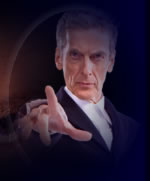 |
 |